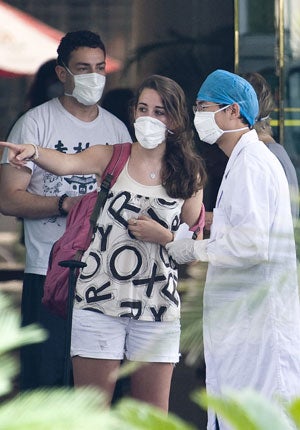Flying ban for people with swine flu symptoms
Airlines' new guidance as expectant mothers are told to avoid public transport

The Government has advised expectant mothers to avoid large crowds and public transport while airlines admitted that they have begun to stop ill passengers from flying in the latest attempts to reduce the number of people catching swine flu.
British Airways and Virgin Atlantic both said they had issued guidance to check-in staff to stop people from boarding flights if there is a clear indication that they have the virus.
Passengers exhibiting symptoms, including having a headache, sore throat, runny nose, and aching muscles, may only be allowed to board a plane if they carry a "fit to fly" certificate from their doctors.
More than 50 British schoolchildren have been told by Chinese health officials that they face up to a week's quarantine – enforced by armed guards – in the four-star Yanxiang Hotel in Beijing, after eight were diagnosed with swine flu during a Government-sponsored trip to Beijing. They are among 278 pupils aged between 13 and 17 who are on a trip to China as part of a scheme to reward pupils studying Mandarin. Chinese health officials tested the children on arrival in the country and discovered some were suffering from abnormally high temperatures.
A further 50 American school students, four of whom have tested positive for swine flu, are quarantined beside them.
The Department of Health warned pregnant mothers and those with children under five to avoid large crowds and unnecessary travel on public transport to try to reduce their exposure to a virus which is particularly dangerous for young children and pregnant women.
The advice was reissued on the NHS's website in the wake of the death of Ruptara Miah, 39, from East London, who died last week shortly after giving birth. Mrs Miah had used a wheelchair for 15 years and suffered underlying health problems, but her death sparked fears that expectant mothers could be particularly vulnerable to the virus because their immune systems are suppressed during pregnancy.
The guidelines, issued in conjunction with the Royal College of Midwives, recommend that pregnant women should change certain aspects of their lifestyles. Among other things, they should stay indoors when practical and limit the movements of their other children to try to stop them from bringing the virus home.
Although the Government urged vulnerable groups to take extra precautions, ministers were quick to play down any suggestion that people should delay having children because of the pandemic.
Public Health minister Gillian Merron said: "While pregnant women are a greater risk group from any type of flu, swine flu is generally a very mild condition and in a very few number of cases is more severe."
Britain currently has the fourth highest number of H1N1 infections and a number of countries including Egypt, Australia, Mexico and China, have put in place screening tests for some British arrivals.
Join our commenting forum
Join thought-provoking conversations, follow other Independent readers and see their replies
Comments